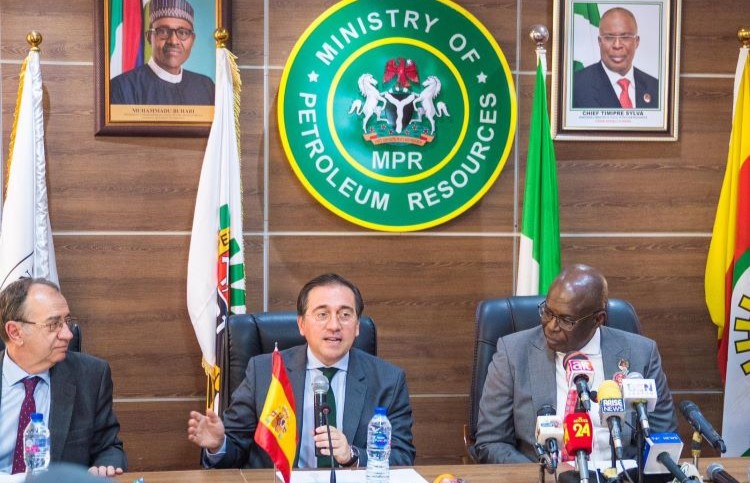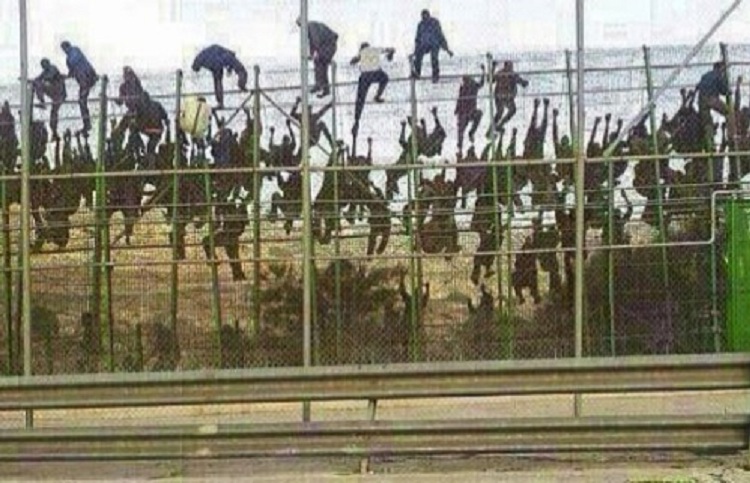The Diplomat
The Minister of Foreign Affairs, José Manuel Albares, endorsed yesterday in Nigeria the interests of large Spanish energy companies in the current process of privatization of oil and gas in the African country, an “excellent partner of Spain in energy matters” in the context of the crisis generated by the Russian invasion in Ukraine.
“Nigeria is an excellent partner for Spain in energy matters,” Albares declared in Abuja, capital of Nigeria, during the second and last day of his second tour of Sub-Saharan Africa, which began on Wednesday in Niger and concluded in Guinea-Bissau.
The main objective of Albares’ trip to Abuja was to obtain a political commitment to guarantee the participation of Spanish companies in the current process of restructuring the energy sector in Nigeria, launched last June with the announcement of the privatization of the large state-owned oil (Nigerian National Petroleum Corporation, NNPC) and gas (Nigerian National Liquefied Gas, NNLG) companies. Nigeria, Africa’s leading oil producer with 1.4 million barrels per day, is the leading exporter of oil to Spain and the third largest exporter of gas. In addition, Spain is Nigeria’s second largest energy customer.
For this reason, Albares traveled to Nigeria accompanied by representatives of the major Spanish companies in the energy sector, Naturgy, Repsol and Cepsa. “Governments must establish a framework for cooperation, but it is the private companies that have to define the contracts and opportunities,” said the minister during the joint press conference with his counterpart, Geoffrey Onyeama. For that reason, he assured, “if our companies wish to have more opportunities, the government is ready to accompany them and to exploit all kinds of support, even financial, if necessary”.
However, Albares was forced to correct these same words just five hours later, after meeting (together with the Spanish business representatives) with the Nigerian Petroleum Minister, Timipre Sylva, and with the heads of NNPC and NNLG. “There has been a little misunderstanding,” he admitted. “When we are talking about financing, we are talking about financing through development cooperation for projects in the Nigerian energy sector or within the framework of ECOWAS,” he said. “I am Minister of Foreign Affairs, not of Energy,” he explained.
In any case, Albares assured that, during his meetings in Abuja, he had received “the guarantee” from the Nigerian government that Spanish companies will be present in the country and will participate in the process of restructuring the energy sector. “It will be market forces that will define the process, but of course there will be new opportunities for private companies,” said the Nigerian Foreign Minister during his press conference with Albares.
Last June, the President of the Government, Pedro Sánchez, received in La Moncloa the President of Nigeria, Muhammadu Buhari, with whom he agreed on the need to “reinforce the energy supply, at a time of special international pressure on the energy markets due to the current war context” and to whom he conveyed “the interest of Spanish companies” in the sector in “continuing to bet on Nigeria in order to seek agreements that ensure a stable supply on a lasting basis”.
Rest of the agenda
In addition, Albares was received yesterday in audience by the Vice-President of Nigeria, Yemi Osinbajo, to whom he conveyed Spain’s support “to his energy transition plan” and assured that our country “will continue to deepen cooperation with Nigeria in the areas of food security, fight against terrorism, migration or energy”.
Albares also met with the president of the Commission of the Economic Community of West African States (ECOWAS, based in Abuja), Omar Touray, with whom he signed a memorandum of understanding on bilateral political consultations and a declaration of intent on future prospects for cooperation. At the end of the meeting, the Minister assured that Spain is “at the disposal of ECOWAS in matters such as energy and infrastructures at regional level”.
After his visit to Nigeria, José Manuel Albares went to Guinea-Bissau -the country that currently holds the rotating presidency of ECOWAS-, where he met with his counterpart, Suzi Barbosa, and visited Spanish Cooperation projects.
On the first day of the sub-Saharan tour, Albares was received by the President of Niger, Mohamed Bazoum, to whom he conveyed Spain’s desire to “continue working together” with his country “to address challenges such as food insecurity, the climate crisis or irregular migration, and for the development of the region”, and with his Niger counterpart, Hassoumi Massoudou, with whom he signed the new Country Partnership Framework. The Minister also visited the GARSI Sahel project, which involves the Guardia Civil, the French Gendarmerie, the Italian Carabinieri and the Portuguese Republican National Guard and which represents, he declared, “a good example of the Team Europe spirit”.






